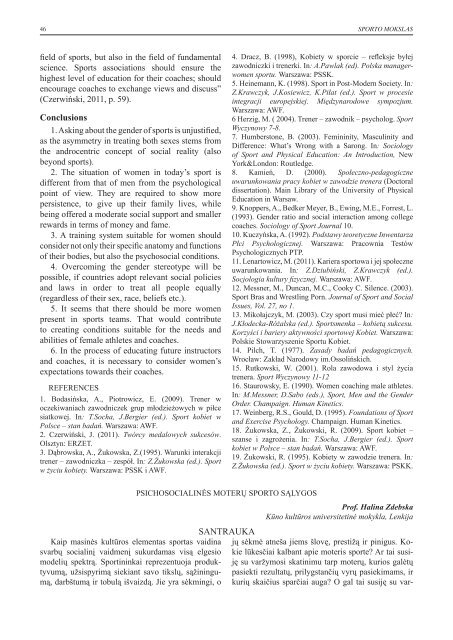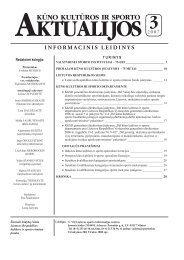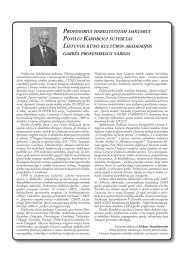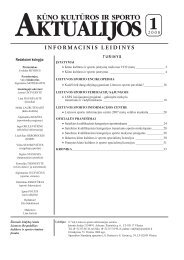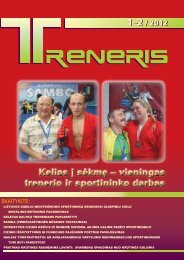Nr. 3 - Lietuvos sporto informacijos centras
Nr. 3 - Lietuvos sporto informacijos centras
Nr. 3 - Lietuvos sporto informacijos centras
You also want an ePaper? Increase the reach of your titles
YUMPU automatically turns print PDFs into web optimized ePapers that Google loves.
46<br />
SPORTO MOKSLAS<br />
field of sports, but also in the field of fundamental<br />
science. Sports associations should ensure the<br />
highest level of education for their coaches; should<br />
encourage coaches to exchange views and discuss”<br />
(Czerwiński, 2011, p. 59).<br />
Conclusions<br />
1. Asking about the gender of sports is unjustified,<br />
as the asymmetry in treating both sexes stems from<br />
the androcentric concept of social reality (also<br />
beyond sports).<br />
2. The situation of women in today’s sport is<br />
different from that of men from the psychological<br />
point of view. They are required to show more<br />
persistence, to give up their family lives, while<br />
being offered a moderate social support and smaller<br />
rewards in terms of money and fame.<br />
3. A training system suitable for women should<br />
consider not only their specific anatomy and functions<br />
of their bodies, but also the psychosocial conditions.<br />
4. Overcoming the gender stereotype will be<br />
possible, if countries adopt relevant social policies<br />
and laws in order to treat all people equally<br />
(regardless of their sex, race, beliefs etc.).<br />
5. It seems that there should be more women<br />
present in sports teams. That would contribute<br />
to creating conditions suitable for the needs and<br />
abilities of female athletes and coaches.<br />
6. In the process of educating future instructors<br />
and coaches, it is necessary to consider women’s<br />
expectations towards their coaches.<br />
References<br />
1. Bodasińska, A., Piotrowicz, E. (2009). Trener w<br />
oczekiwaniach zawodniczek grup młodzieżowych w piłce<br />
siatkowej. In: T.Socha, J.Bergier (ed.). Sport kobiet w<br />
Polsce – stan badań. Warszawa: AWF.<br />
2. Czerwiński, J. (2011). Twórcy medalowych sukcesów.<br />
Olsztyn: ERZET.<br />
3. Dąbrowska, A., Żukowska, Z.(1995). Warunki interakcji<br />
trener – zawodniczka – zespół. In: Z.Żukowska (ed.). Sport<br />
w życiu kobiety. Warszawa: PSSK i AWF.<br />
4. Dracz, B. (1998), Kobiety w sporcie – refleksje byłej<br />
zawodniczki i trenerki. In: A.Pawlak (ed). Polska managerwomen<br />
sportu. Warszawa: PSSK.<br />
5. Heinemann, K. (1998). Sport in Post-Modern Society. In:<br />
Z.Krawczyk, J.Kosiewicz, K.Piłat (ed.). Sport w procesie<br />
integracji europejskiej. Międzynarodowe sympozjum.<br />
Warszawa: AWF.<br />
6 Herzig, M. ( 2004). Trener – zawodnik – psycholog. Sport<br />
Wyczynowy 7-8.<br />
7. Humberstone, B. (2003). Femininity, Masculinity and<br />
Difference: What’s Wrong with a Sarong. In: Sociology<br />
of Sport and Physical Education: An Introduction, New<br />
York&London: Routledge.<br />
8. Kamień, D. (2000). Społeczno-pedagogiczne<br />
uwarunkowania pracy kobiet w zawodzie trenera (Doctoral<br />
dissertation). Main Library of the University of Physical<br />
Education in Warsaw.<br />
9. Knoppers, A., Bedker Meyer, B., Ewing, M.E., Forrest, L.<br />
(1993). Gender ratio and social interaction among college<br />
coaches. Sociology of Sport Journal 10.<br />
10. Kuczyńska, A. (1992). Podstawy teoretyczne Inwentarza<br />
Płci Psychologicznej. Warszawa: Pracownia Testów<br />
Psychologicznych PTP.<br />
11. Lenartowicz, M. (2011). Kariera <strong>sporto</strong>wa i jej społeczne<br />
uwarunkowania. In: Z.Dziubiński, Z.Krawczyk (ed.).<br />
Socjologia kultury fizycznej. Warszawa: AWF.<br />
12. Messner, M., Duncan, M.C., Cooky C. Silence. (2003).<br />
Sport Bras and Wrestling Porn. Journal of Sport and Social<br />
Issues, Vol. 27, no 1.<br />
13. Mikołajczyk, M. (2003). Czy sport musi mieć płeć? In:<br />
J.Kłodecka-Różalska (ed.). Sportsmenka – kobietą sukcesu.<br />
Korzyści i bariery aktywności <strong>sporto</strong>wej Kobiet. Warszawa:<br />
Polskie Stowarzyszenie Sportu Kobiet.<br />
14. Pilch, T. (1977). Zasady badań pedagogicznych.<br />
Wrocław: Zakład Narodowy im.Ossolińskich.<br />
15. Rutkowski, W. (2001). Rola zawodowa i styl życia<br />
trenera. Sport Wyczynowy 11-12<br />
16. Staurowsky, E. (1990). Women coaching male athletes.<br />
In: M.Messner, D.Sabo (eds.), Sport, Men and the Gender<br />
Order. Champaign. Human Kinetics.<br />
17. Weinberg, R.S., Gould, D. (1995). Foundations of Sport<br />
and Exercise Psychology. Champaign. Human Kinetics.<br />
18. Żukowska, Z., Żukowski, R. (2009). Sport kobiet –<br />
szanse i zagrożenia. In: T.Socha, J.Bergier (ed.). Sport<br />
kobiet w Polsce – stan badań. Warszawa: AWF.<br />
19. Żukowski, R. (1995). Kobiety w zawodzie trenera. In:<br />
Z.Żukowska (ed.). Sport w życiu kobiety. Warszawa: PSKK.<br />
Kaip masinės kultūros elementas sportas vaidina<br />
svarbų socialinį vaidmenį sukurdamas visą elgesio<br />
modelių spektrą. Sportininkai reprezentuoja produktyvumą,<br />
užsispyrimą siekiant savo tikslų, sąžiningumą,<br />
darbštumą ir tobulą išvaizdą. Jie yra sėkmingi, o<br />
PSICHOSOCIALINĖS MOTERŲ SPORTO SĄLYGOS<br />
Santrauka<br />
Prof. Halina Zdebska<br />
Kūno kultūros universitetinė mokykla, Lenkija<br />
jų sėkmė atneša jiems šlovę, prestižą ir pinigus. Kokie<br />
lūkesčiai kalbant apie moteris sporte? Ar tai susiję<br />
su varžymosi skatinimu tarp moterų, kurios galėtų<br />
pasiekti rezultatų, prilygstančių vyrų pasiekimams, ir<br />
kurių skaičius sparčiai auga? O gal tai susiję su var-


